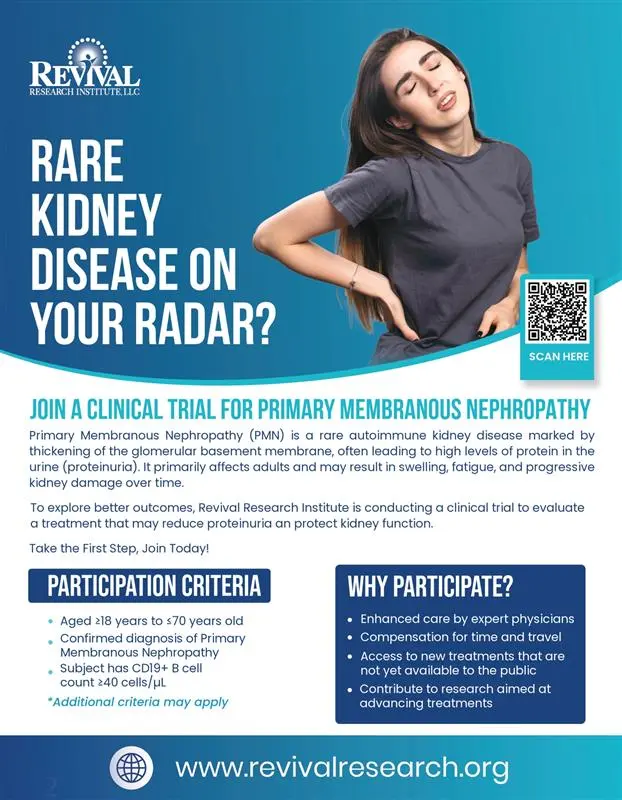Struggling with Primary Membranous Nephropathy?
A Clinical Research Study May Be an Option for You!
Primary membranous nephropathy (PMN) is a kidney disorder where the immune system mistakenly attacks the filtering units of the kidneys, leading to protein leakage in the urine. In healthy kidneys, waste is filtered while essential proteins remain in the blood. With PMN, this process is disrupted, and proteins like albumin pass into the urine, signaling impaired kidney function. PMN is one of the leading causes of nephrotic syndrome in adults and can progress if left untreated.
Clinical trials for PMN are vital in advancing treatment. These studies aim to explore new therapies and improve outcomes for patients living with this rare kidney condition.
You may be eligible for the Primary membranous nephropathy (PMN) Clinical Trials if you are:
Eligibility criteria for heart failure clinical trials in Michigan:
- Age between 18 to 70 years
- Diagnosed with Primary Membranous Nephropathy (PLA2R-positive)
- Urine protein-creatinine ratio (UPCR) of ≥ 2.0 g/g
*Additional criteria may apply.
Participation in Primary Membranous Nephropathy clinical trials in Texas or other locations provides a chance to receive expert care, free study-related medication, and regular health monitoring by experienced medical professionals.

About the Primary Membranous Nephropathy Clinical Trials
At Revival Research Institute, is conducting clinical trials for primary membranous nephropathy (PMN). These studies explore the safety and effectiveness of investigational treatments to help manage PMN and slow kidney disease progression. Conducted under strict ethical standards, our goal is to advance potential treatment options for kidney conditions.
We are currently enrolling participants in clinical trials, specifically those dealing with primary membranous nephropathy. If you meet the eligibility criteria, you may have the opportunity to receive innovative treatment at no cost.
*All study procedures and study-related treatments, including the investigational drug, are provided at no cost, and no insurance is required to participate.
*To take the next step, submit the form above, and our research staff will contact you to determine if you qualify for the study. There may be a brief discussion about your health and medical history.
Get Started
What to Expect?
If you have primary membranous nephropathy, you may be eligible for clinical trial testing new treatment options. After you fill out the interest form above, someone from our research team will contact you for a short pre-screening to see if you meet the basic requirements.
If you qualify, we’ll ask you to review and sign an Informed Consent Form (ICF), which explains the study, including what’s involved, possible benefits, and risks.
After giving your consent, you’ll be invited to a screening visit at one of ours clinical research sites. During this visit, we’ll go over your medical history, do a physical exam, and run some lab tests to confirm eligibility.
Our research team will guide you through every step and make sure you fully understand what participation involves. You’ll have the chance to ask any questions before deciding to join. By taking part, you’re helping advance research that could improve future treatment for primary membranous nephropathy.
*All study-related care is provided at no cost, and no insurance is required.
Age
18 to 70 years old
Condition
Primary Membranous Nephropathy
Location
Michigan & Texas
he Importance of Primary Membranous Nephropathy Clinical Trials

Primary membranous nephropathy (PMN) is a rare kidney disease where the immune system attacks the kidney’s filtering units, leading to protein leakage in the urine. Early intervention is crucial to help slow disease progression and protect kidney function. That’s why finding effective treatments through clinical trials is so important. Revival Research Institute is dedicated to advancing potential therapies that could change the future for individuals living with PMN.
These clinical trials are vital for developing new treatment options that may improve patient outcomes. By participating, you not only contribute to advancing medical research but also gain access to investigational therapies that could support your kidney health.
Primary Membranous Nephropathy can be caused by:
- Immune system dysfunction
- Genetic predisposition
- Environmental triggers
Symptoms of Primary Membranous Nephropathy include:
- Swelling in the legs, ankles, or around the eyes
- Foamy or frothy urine (a sign of protein loss)
- Fatigue and low energy levels
- Shortness of breath (in advanced cases)
Frequently Asked Questions
Want to Learn More About Primary Membranous Nephropathy?
Look at some of our most frequently asked questions about primary membranous nephropathy, and what they may be all about. Cannot find the answer you are looking for? Call us at: +1 (248) 721-9539
What is Primary Membranous Nephropathy (PMN)?
PMN is an autoimmune kidney disease where the immune system mistakenly attacks the kidneys, leading to protein leakage in the urine and risk of kidney damage.
How is PMN diagnosed?
Diagnosis involves kidney biopsy, detection of anti-PLA2R antibodies in the blood, and lab tests such as UPCR and eGFR.
What if I’ve used other treatments before?
You may still qualify. Prior treatment with ACEi/ARB is allowed, but use of rituximab or similar B-cell depleting agents within 24 weeks prior is not.
Is this trial safe?
In prior studies, investigational drug was well tolerated, with manageable side effects and no dose-limiting toxicities. Patients will be closely monitored for safety throughout the trial.


